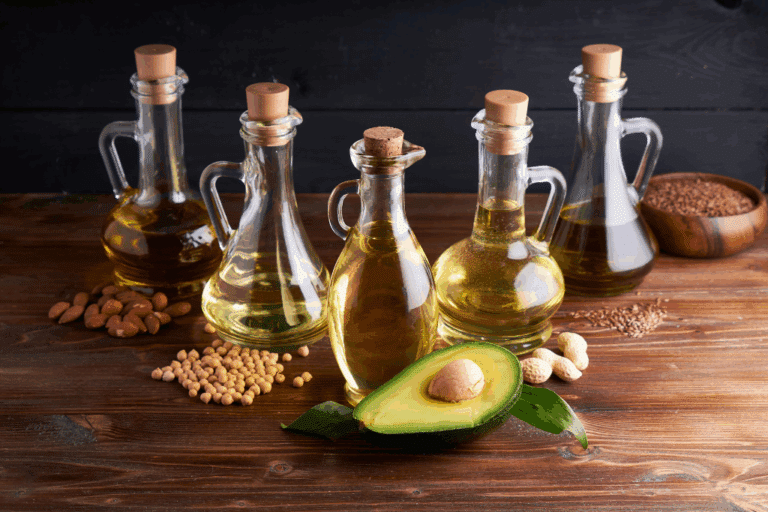Spend five minutes scrolling through social media and you’ll see the seed oil debate everywhere. Some influencers blame them for everything from inflammation to obesity. Others roll their eyes and say seed oils are no worse than olive oil. It’s confusing, and I get why so many women ask me whether they should avoid them altogether.
The truth, as usual, lives somewhere in the middle. Let’s dig into what seed oils are, why they’re controversial, and what the research really tells us.
What exactly are seed oils?
Seed oils are vegetable oils extracted from plant seeds. The most common ones you’ll find in the grocery store and in restaurant food include:
- Soybean oil
- Corn oil
- Sunflower oil
- Safflower oil
- Cottonseed oil
- Canola oil
- Grapeseed oil
They’re cheap to make, have a neutral taste, and work well in processed foods. That’s why they show up in everything from salad dressings and crackers to fast-food French fries.
From a nutrition standpoint, seed oils are mostly made up of polyunsaturated fatty acids (PUFAs). They’re especially high in omega-6 fats, mainly linoleic acid. They also contain small amounts of omega-3s and some vitamin E.
Why do seed oils have a bad reputation?
Seed oils are often criticized for two main reasons:
- Too many omega-6 fats. The modern diet is heavy on omega-6 fats and light on omega-3s. Some experts worry that this imbalance leads to inflammation. Since chronic inflammation is linked to heart disease, diabetes, autoimmune issues, and more, this raises concern.
- Processing and heat. Most commercial seed oils are extracted with high heat and chemical solvents. This process can create byproducts that are potentially harmful. And when oils are reused in restaurant fryers over and over, they oxidize even more, creating compounds that may damage cells.
On paper, that sounds alarming. But how does this play out in real people?
What the research really says
This is where things get interesting. The idea that omega-6 fats automatically cause inflammation is mostly based on theory and animal studies. When researchers look at people, the story is different.
Large clinical studies and reviews have not consistently shown that higher intake of linoleic acid increases inflammation in humans. In fact, many studies suggest the opposite.
- A 2017 review in Circulation found that people who ate more linoleic acid had a lower risk of coronary heart disease.
- A 2020 meta-analysis showed that replacing saturated fats with polyunsaturated fats (including from seed oils) reduced heart disease risk.
- Some research even suggests that omega-6s can lower LDL (“bad”) cholesterol when they replace butter or lard in the diet.
So, the evidence doesn’t support the idea that seed oils are poison. At the same time, most studies don’t look at oils that have been repeatedly heated in deep fryers or packaged into ultra-processed foods. That’s an important distinction.

Want to create a custom longevity health plan?
You’re in the right place.
I can help you with a functional approach to midlife women’s health including hormone balance, gut health, autoimmune issues, bone health, heart health and more!
The problem with processed and fried foods
Animal studies do show that oxidized seed oils can cause inflammation, oxidative stress, and gut damage. While the evidence in humans is less clear, it makes sense to be cautious. Oils behave differently once they’ve been heated and reheated.
Think about a fast-food fryer. That oil is used all day long at high heat. By the time you dip your French fries in it, the chemical structure of the oil has changed. Those damaged fats are not the same as the fresh oil you might drizzle on vegetables at home.
This helps explain why swapping butter for soybean oil in a controlled diet study can look beneficial, but eating fried chips cooked in soybean oil every day might not.
Do seed oils cause obesity and diabetes?
Another common claim is that seed oils drive weight gain and insulin resistance. Right now, the evidence doesn’t back that up. No strong human studies show that linoleic acid directly causes obesity or diabetes.
Here’s the catch: seed oils are a big ingredient in ultra-processed foods, which are linked to weight gain and poor metabolic health. So while the oils themselves may not directly cause diabetes, the foods they’re often found in—cookies, crackers, chips, fried foods—definitely do us no favors.
How to put this in perspective
Instead of stressing about every drop of seed oil, it’s more helpful to think about your overall diet. If your meals are built mostly on fast food, fried food, and packaged snacks, your health will suffer—seed oils or not. But if you’re cooking at home, using a mix of oils in reasonable amounts, and eating plenty of vegetables, fruit, protein, and whole grains, seed oils in moderation won’t derail your health.
Here are some practical tips:
- Focus on whole foods. Build your meals around vegetables, fruits, lean protein, beans, nuts, and whole grains. Oils are just a small piece of the bigger picture.
- Make olive and avocado oils your staples. These are rich in monounsaturated fats and antioxidants, making them great everyday choices.
- Limit fried and ultra-processed foods. Most of the negative effects from seed oils come from the way they’re used in processed foods.
- Add more omega-3s. Eat fatty fish like salmon and sardines or plant sources like flax, chia, and walnuts. This helps balance out omega-6 intake.
- Use the right oil for the job. For high-heat cooking, avocado oil or ghee is more stable. Save extra virgin olive oil for lower-heat cooking or drizzling.
Bottom line
Seed oils are not the villain they’re made out to be, but they’re not a nutritional magic bullet either. When used fresh and in moderation, they can be part of a healthy diet. The real problem comes when they’re heated, oxidized, and added to ultra-processed foods that dominate the modern diet.
If you’re aiming for better healthspan and longevity, here’s my advice:
- Keep olive oil and avocado oil as your go-to staples.
- Balance your fats with omega-3 rich foods.
- Use seed oils sparingly, and avoid fried and heavily processed foods that rely on them.
The goal isn’t perfection or fear of a single ingredient. It’s building a pattern of eating that supports your body, reduces inflammation, and helps you thrive through midlife and beyond.
References
Farvid, M. S., Ding, M., Pan, A., Sun, Q., Chiuve, S. E., Steffen, L. M., Willett, W. C., & Hu, F. B. (2014). Dietary linoleic acid and risk of coronary heart disease: a systematic review and meta-analysis of prospective cohort studies. Circulation, 130(18), 1568–1578. https://doi.org/10.1161/CIRCULATIONAHA.114.010236
Hooper, L., Martin, N., Abdelhamid, A., & Davey Smith, G. (2015). Reduction in saturated fat intake for cardiovascular disease. Cochrane Database of Systematic Reviews, (6). https://doi.org/10.1002/14651858.CD011737
Mozaffarian, D., & Wu, J. H. Y. (2018). Flavonoids, polyunsaturated fatty acids, and cardiometabolic health: A review of evidence and mechanisms. Current Atherosclerosis Reports, 20(3), 8. https://doi.org/10.1007/s11883-018-0713-6
Zheng, J. S., et al. (2020). Effects of replacing saturated fat with linoleic acid on coronary heart disease and cardiovascular disease risk: A systematic review and meta-analysis of randomized controlled trials. American Journal of Clinical Nutrition, 111(2), 474–486. https://doi.org/10.1093/ajcn/nqz332
Dr. Anna Garrett is a menopause expert and Doctor of Pharmacy. She helps women who are struggling with symptoms of perimenopause and menopause find natural hormone balancing solutions so they can rock their mojo through midlife and beyond. Dr. Anna is the author of Perimenopause: The Savvy Sister’s Guide to Hormone Harmony. Order your copy at www.perimenopausebook.com.
Dr. Anna is available for 1-1 consultations. Find out more at www.drannagarrett.com/lets-




